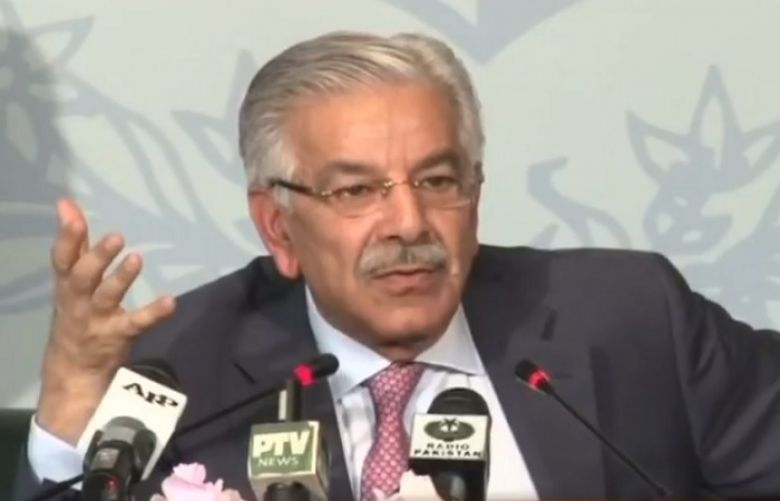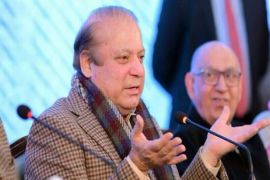Pakistan’s Foreign Minister Khawaja Asif has stressed that the United States (US) should respect his country’s territorial integrity. Asif held a news conference following the conclusion of a three day envoys conference and spoke of Pak-US relations.
"We want to stay engaged with the United States. We have had a long relationship with them, spanning 70 years,” he said but lamented that people in Washington don’t have a full comprehension of the facts. “We will defend our territorial integrity and not sacrifice it at any cost. We expect the US to accept that.”
“They (US) are in a way oblivious to what is happening in the region. We will not accept the scapegoating of the Pakistani nation.”
Asif added that the consultation process between the two countries must continue as “we are friends”. “The three-day conference that we had, we discussed Pak-US relations, the United Nations and also India,” shared Asif.
The present situation in the region and the world as a whole is changing rapidly, he said, adding that we have not seen such changes since the Second World War.
“We feel we should take a pragmatic view of the current situation,” the foreign minister argued, adding that the world’s perception when it comes to Pakistan needs to be corrected.
“We are the only country in the world which is winning the war on terror, and we will continue winning it,” said Asif while praising Pakistan’s performance in the war on terror.
He added that we should be proud of winning the war — as we are the only country to do so. “The situation is much better than what it was four years ago and it will improve further. We have sacrificed a lot, our soldiers and civilians have both paid the price for this victory,” he said.
“We will further Pakistan’s narrative through our envoys in other countries and the Pakistani diaspora should also do the same.” “Our existence and sovereignty are on the line. The stakes are much higher for us when compared to other countries.”
He added that Pak-India relations have been reviewed in the context of the situation in occupied Kashmir. “Many friendly relations have supported us, including China and Turkey. We have reviewed relations with all countries and have decided to improve relations with those with whom our relations are not that good.”
He said a new paradigm, keeping in view our internal and external situation, will be formed. The prime minister has also advised it and it will be presented in both Houses of Parliament for review.
Asif said he will be leaving for China today and will also soon visit Iran. "We want to stay engaged with the United States. We have had a long relationship with them, spanning 70 years,” he said but lamented that people in Washington don’t have a full comprehension of the facts.
The foreign minister also said that Pakistan has had two policies regarding Afghanistan, one which was developed in the ‘80s and the other which came about after 9/11.
With regards to the ongoing Rohingya crisis in Myanmar, he said a meeting of the Organisation of Islamic Countries is being held in Astana in the next few days during which the issue will be raised. “This matter will be raised forcefully and we will come forward with an OIC policy on the issue,” he assured.
Coming back to Afghanistan, Asif said the Afghans are looking at the problem of terrorism from their own “narrow view".
In response to the recent 9th BRICS Summit declaration in China in which Pakistan-based militant groups were mentioned alongside others, he said “China has issued a clarification today and the same words were used in Pakistan’s presence during the last Heart of Asia conference.”
He added that India wanted to make the resolution Pakistan-centric but China did not agree.
Referring to Russia, Asif said the country plays a vital role in the region and they have continuously improved their relations with regional countries. “Russia can further improve its relations in the region as it is deeply affected by what happens here [region]."
When asked about relations with Iran and Saudi Arabia, Asif said “we pray that our brothers [Iran and KSA] improve their relations."
If Pakistan can play a role in this matter, we will do what ever is required to bring these two brother relations together, he stated.
Pakistan has not been isolated, reiterated the foreign minister. “If more than 100,000 soldiers from 16 countries could not succeed [in Afghanistan], we should not be blamed," he said.
“The war can be won with Pakistan’s experience and not without Pakistan’s cooperation,” suggested Asif while referring to the 16-year long Afghan conflict.
Talking about militancy, he said we need to change the entire culture of the country "as it has been part of our ethos for the last 40 years. It is not something that can be changed in a year or two”. “We know we have a problem, we have diagnosed it but treatment will take time,” added Asif.
Indirectly referring to former ambassador Abdul Basit, Pakistan’s former envoy to India who recently made public his grievances with Pakistan's envoy to the US, the minister said his grievances are personal and should not have been brought to the media.







